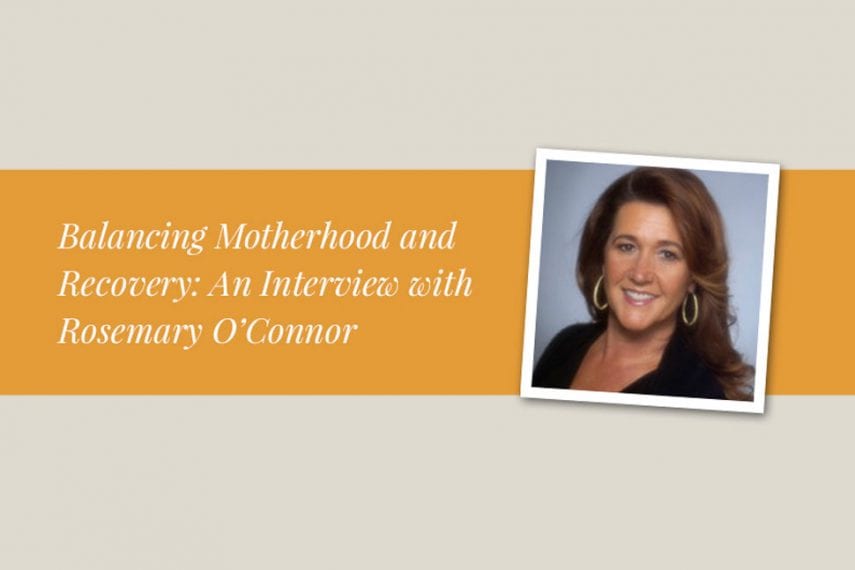Balancing Motherhood and Recovery: An Interview with Rosemary O’Connor

16 years ago Rosemary O’Connor got sober, but it was a drastic event that made her realize she needed help. Separated from her now ex-husband, she was spending her evenings drinking away the pain and guilt of her failing marriage and the damage it was causing her three young children. One night she hired an 11-year-old babysitter and told her kids she would be home in a couple of hours. But Rosemary didn’t come home that night. The next morning, still drunk and wearing only one shoe, she finally stumbled home to find her best friend and soon-to-be-ex-husband in her house. They had been out all night looking for her. But that wasn’t what got to Rosemary. “I came home; my three kids were in their jammies sitting there, looking at me like ‘Who is this person?’” she tells me. “I saw the look on my kids’ faces and I knew that was not the type of mother I wanted to be. I asked for help that very day. I knew if I didn’t get help that day, 5 o’clock would roll around and I would start drinking again.”
Since that night, Rosemary has not only broken free from alcohol addiction, but has forged a successful career in the recovery field helping other women find their way back from addiction. In 2013 she founded ROC Recovery Services for Women, to provide a suite of recovery services. Ten years ago she was certified as a professional life coach and is also a certified addiction coach. She coaches clients by phone, Skype, or in person who are suffering from chemical addiction, codependency, and love addiction. She also has a unique sober living environment designed for women over 30 years of age. As her reputation within the recovery community grew, so too did demand for her expertise in the recovery experiences of women and, more specifically, mothers. Unable to take on so many sponsees, but still wanting to help the women in need, she wrote a book. Recently, I had the opportunity to speak with Rosemary about her book, published by Hazelden in 2015, A Sober Mom’s Guide to Recovery: Taking Care of Yourself to Take Care of Your Kids, the needs of women in recovery, and the benefits of sober living environments.
Hope is Just a Phone Call Away
866-922-1350Negotiating Motherhood and Sobriety
Recovering from alcohol or drug addiction is one of the hardest things most people will ever do. When you are a mother, balancing recovery with parenthood can present an additional layer of complex emotional and practical challenges. Rosemary began writing with the intention of sharing her keen insights garnered from both personal experience and client observation, to help women address those challenges in their daily lives throughout their recovery journey. Over the course of 26 chapters, she delves into topics ranging from stress and relapse to relationships, sex, and dating, providing practical tips on how to cope, heal, and protect your sobriety. As Rosemary says, “I wrote the book to share with mothers that they are not alone, that there is no shame, and that everything can be healed.”
The concept of shame is one that many mothers in recovery struggle with, affecting not only your view of yourself, but your relationship with your children. Rosemary explores the role of shame in your recovery process and gives you tools to disrupt self-shaming thoughts that interfere with your healing. She tells me that women often parent from a place of guilt while in early recovery, to make up for the damage caused by their addiction. “It can manifest in overdoing things for the kids, like buying things they can’t afford or don’t need.” However, the guilt is only a symptom of underlying shame. “The guilt is ‘I did damage my family’ but underneath that is a feeling of ‘I don’t deserve’ or ‘I’m not good enough,’” Rosemary says. In order to emotionally free yourself from that guilt and shame, she suggests simple but powerful steps you can take in your own life, including making a list of all the things you do well as a mom and talking kindly to yourself. Her book also contains a mantra you can use to ground yourself and interrupt self-shaming.
Rosemary believes that mothers in recovery are particularly vulnerable to getting overwhelmed by multiple and sometimes competing responsibilities, especially when newly sober. Not only must they juggle the routine tasks of “getting kids dressed and fed and getting them to school,” but they also have to find the time to actively participate in recovery through meetings and working with a sponsor, learn how to effectively maneuver through romantic relationships, manage the practicalities of day-to-day life, and somehow find the time for self-care. As Rosemary says:
Society expects women and especially mothers to take care of everybody else before we take care of ourselves—to the detriment of ourselves. So many women and mothers have to learn how to eat right, sleep right, and get rid of excess anger.
For many women, protecting against exhaustion and emotional overload means learning how to say no and finding ways to care for yourself through rituals that relax you and rejuvenate your soul. “I’m a big fan of bubble baths, exercise, or even just a quick nap.” By giving yourself permission to prioritize your own needs, you can not only strengthen your recovery and sense of well-being, but ultimately enhance your ability to parent and engage in healthy, nurturing, and loving relationships with others.
Rosemary is touched by the positive response the book has received thus far and is proud to support women through their healing journeys. “That’s been the best part. It still chokes me up—the emails and the phone calls and the posts on Facebook from complete strangers,” Rosemary says, smiling. “I’ve gotten responses from both women and men that it’s been helpful to them and that they could relate. It’s just been wonderful.”
Support in Sober Living Environments
For many, sober living environments provide an important stepping stone between residential addiction treatment programs like Alta Mira and the return to daily life. Rather than acting as another treatment facility, sober living allows you to practice your newly developed skills within a supportive living space, surrounded by others who share your struggles and commitment to sobriety. By offering interim housing within a dedicated recovery community, sober living gives you the ability to gradually transition back to your ordinary environment at a pace that makes sense for you, fortifying your recovery and decreasing your risk of relapse. As Rosemary says, “Sober living is like a bridge where you start learning how to do life.”
However, Rosemary found many of her female clients over 30 were reluctant to go to a typical sober living with a younger clientele where typically 8- 12 residents live. With this in mind, Rosemary founded a sober living environment for women over 30. In a beautiful house located on a private beach in San Rafael, Rosemary invites three clients at a time to participate in the supportive sober living experience with daily recovery and life coaching. She believes that the women—both with and without children—benefit from recovery services built around the unique struggles they face, to facilitate long-term sobriety and promote sustainable well-being. Being able to share your thoughts, feelings, frustrations, and fears with other women who are going through the same thing you are can be extraordinarily powerful and validating.
Yet sober living can also present other concerns for women who have children. As Rosemary tells me, “A lot of mothers think ‘I can’t go into sober living. I’ve got to get back to my kids, I’ve got to hurry up and make everything okay.’” This desire to rush back to everyday life after residential treatment can compromise your recovery. “A lot of women relapse because of the overwhelm. It’s just too much to handle.” By coming to sober living, you can move on to the next stage of recovery with the structure and support you need to maintain your sobriety while gradually transitioning back to your normal life.
I help them put the focus first on themselves, because if they don’t get better and they’re not stable in their sobriety, they’re going to relapse and cause more damage. Three months of treatment and three months of sober living sounds like a long time, but I have moms stay for even longer.
Women without children can also find unique benefits in a female sober living environment. “What happens for a lot of single women is that they go home to a completely empty house and the loneliness factor is a relapse trigger. A lot of women drank or used in that house.” By stepping down from residential care to a sober living environment, these women are able to continue working on their recovery within a supportive community. “They definitely need the support of other women going through the same thing.”
Begin Your Recovery Journey Today
866-922-1350Hope and Healing
Rosemary’s story is one of hope, redemption, and the fulfilling of potential through addiction recovery.
My 16 years in recovery has been quite a ride. I’ve had a lot of struggles being a single mom, experiencing depression, and struggling with one of my kids and their addiction. But on the other hand, a lot of great things have happened. My ex and I have learned to forgive each other and have successfully navigated co-parenting our three children. I’ve been able to open my own company and hire sober women.
By drawing on her own struggles to create recovery experiences that address the unique needs of women, Rosemary has been able to help hundreds of clients nurture themselves through their own healing journeys and find the strength to create richer lives for both themselves and their families.
Healing does happen, and the gifts and the miracles keep coming.
Alta Mira is a residential addiction treatment center treating drug and alcohol addiction as well as co-occurring mental health disorders. Contact us to learn more about our renowned Bay Area programs and how we can help you or your loved one start the journey toward recovery.






